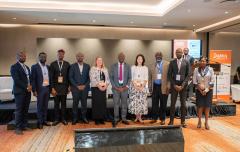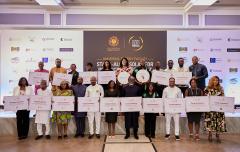UN-Energy Chair Yumkella commends EU Leadership, calls for commitments to sustainable energy for all
BRUSSELS, 8 February 2012 - Kandeh K. Yumkella, Chair of UN-Energy, today announced a "Framework for Action" which will mobilize and facilitate commitments by governments, the private sector, and civil society towards achieving UN Secretary-General Ban Ki-moon’s Sustainable Energy for All initiative.
Ban’s initiative has set three interlinked targets to be achieved by 2030: ensuring universal access to modern energy services; doubling the global rate of improvement in energy efficiency; and doubling the share of renewable energy in the global energy mix.
The "Framework for Action" proposes several high-value areas for action at the national and international level, including efforts to expand energy access, promote efficiency standards and policies, and strengthen investment in renewables.
Speaking at a conference hosted at the European Parliament in Brussels, Yumkella said: "This Framework will enable governments, the private sector, and civil society groups to make specific commitments to action which will drive progress from the boardroom to the smallest village, enabling the world to achieve sustainable energy for all by 2030."
Yumkella commended the European Union's support of the Secretary-General's initiative and heralded its leadership in making energy access central to its development efforts, while also drastically improving energy efficiency and spurring renewable energy deployment at home through its 20-20-20 targets.
"Europe has demonstrated leadership by example on energy access and through its long-term vision on renewables and efficiency. We need to replicate these examples throughout the world and accelerate actions that help us achieve sustainable energy for all by 2030," Yumkella said.
Europe is advancing sustainable energy to the top of the global development agenda. Last week the European Parliament passed a comprehensive resolution on the need to achieve universal energy access. The European Union has also made energy one of the three thematic priorities of its new "Agenda for Change."
Increasing access to modern energy services is a prerequisite to creating social and economic opportunities that can improve the lives of the world's poorest. Progress is desperately needed, as one person in five worldwide still lacks access to electricity. Nearly three billion people -- more than 40 per cent of the world -- rely on wood, coal, charcoal or animal waste for cooking and heating.
"We need change, and we need it urgently. We can - and we must - give three billion people the chance to build more productive, healthier lives," said Yumkella.
At the same time, Yumkella added that Europe stood to gain from accelerating the transition to low-emission technologies. More stringent commitments to energy savings and concrete targets for renewables by 2030 will unlock private-sector investments across Europe and deliver on the vision of a low-carbon future laid out in Europe's Energy Roadmap 2050. The Roadmap 2050 project is an initiative of the European Climate Foundation (ECF).
"Especially in difficult economic times, focusing on sustainable energy will open new opportunities for increasing Europe's competitiveness and stimulating much-needed growth and jobs," said Yumkella.
European Commissioner for Development, Andris Piebalgs, who took part in the event, said: "We are all aware of the fundamental role that energy access plays as a driver for development, in delivering health, education, food security and economic growth, to name but a few. With around EUR 2 billion allocated in the energy sector worldwide, the EU is a leader in empowering the world. Our energy partnership with Africa has already provided access to energy to 13 million people. We must join forces with the industry, academics and partner countries to foster access to sustainable energy to all by 2030."
"The EU will throw its weight behind putting sustainable energy at the top of the global development agenda. Through the promotion of our technology and expertise, combined with a targeted use of our aid funding, we will aim at increasing access to modern energy services to the world's poorest. This is a prerequisite for creating social and economic opportunities that can improve their lives on the long run," he added.
Commissioner Piebalgs is a member of the high-level Group on Sustainable Energy for All, co-chaired by Yumkella and Charles Holliday, Chairman of Bank of America. The Group is leading the effort to mobilize and facilitate commitments to action that will drive change on the ground. These commitments will be featured at the UN Conference on Sustainable Development (Rio+20) in June.
The European rollout of the International Year of Sustainable Energy for All was organized by the charity Practical Action, the United Nations Foundation, and the Stockholm Environment Institute



